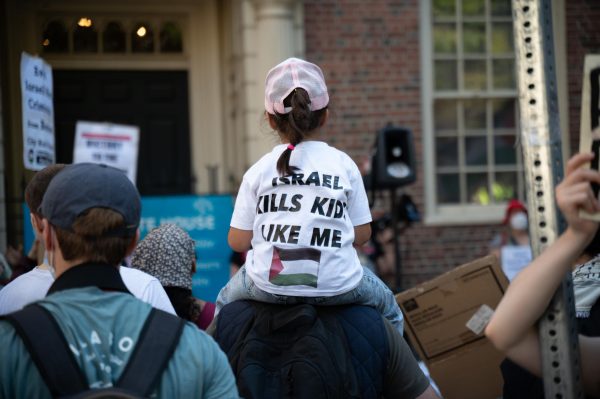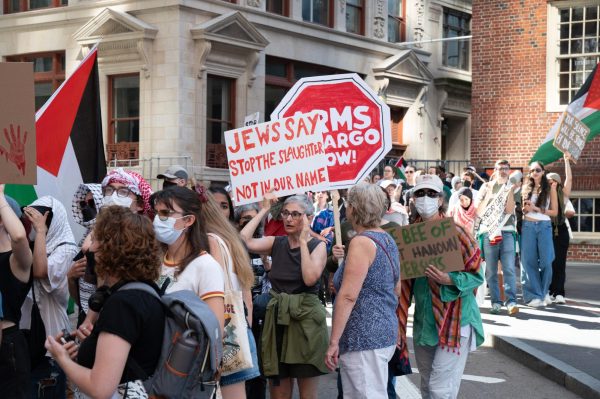A sea of red, green, and white keffiyehs flooded Government Center last week as hundreds of protesters gathered outside the Israeli Consulate to protest against the United States’ continued support of Israel. The protest marked two years after the deadly Oct. 7 attacks by Hamas and the following deaths of tens of thousands of Palestinians and displacement of millions in Gaza that have resulted from Israeli military campaigns since that day.
The group marched from the Israeli consulate near City Hall to the office of Boston Consulting Group in the Seaport, identifying both sites as key symbols of the United States’ support of Israel.
“BCG is a Boston-based corporation that actually participated in the creation of the so-called Gaza Humanitarian Foundation,” Lea Kayali, an organizer from the Palestinian Youth Movement, told The Beacon. “[BCG] has engineered the aid distribution killing fields in Gaza that have led to thousands of people being murdered in just the last few months.”
BCG played a key role in establishing the Gaza Humanitarian Fund, which was backed by the US and Israel. The United Nations, however, condemned the plan, which encouraged the migration of Palestinians out of Gaza. The U.N. human rights office has reported that over 1,000 Palestinians have been killed by Israeli soldiers while trying to reach aid at GHF distribution sites.
“When we protest the Raytheons, the Elbit Systems, the Lockheed Martins of the world, let it be known that the Boston Consulting Group is nothing more than a weapons company in disguise,” Kayali said to the crowd standing in front of the entrance to the office building. “We need to ensure that BCG can never, never relieve itself of the stain of its complicity.”

Last week, before Sunday’s protest, President Donald Trump announced a new ceasefire deal formulated alongside Israeli Prime Minister Benjamin Netanyahu. Hamas agreed to the deal, with conditions, and the two parties gathered in Egypt for further peace talks.
“This has to end, and it has to end now. We don’t know how this new agreement, or what it really means, but as long as Palestinians are starving and being killed, we’ll be [protesting],” Paul Shannon, a member of the executive committee of Massachusetts Peace Action, said in an interview at the rally. “All we know is as long as the killing continues, we have to call for all support from Israel to end. Enough is enough.”
Joe Tache, an organizer with the Boston Party for Socialism and Liberation, told the crowd that they should be skeptical of the new ceasefire deal, because “these are not negotiations that have happened between equal parties.”
“It’s possible that, as they have so many times before, these negotiations fall through, because Benjamin Netanyahu and the Israelis have proven time and time again that they don’t want peace,” he said.
This week, Trump announced a ceasefire agreement had been reached. The ceasefire went into effect today, according to the Israeli military, and thousands in the Gaza Strip began returning to the north where they had been displaced by the millions. This marks the first phase of a 20-point peace plan, which Trump and Netanyahu revealed in September, now agreed to by both Israel and Hamas. It includes the withdrawal of Israeli troops to an agreed-upon line and the release of all remaining hostages by Hamas.
On Sunday, Tache spoke about the symbolism of the march starting at Government Center, saying that the United States government is not only complicit but active in the conflict.
“This genocide, we should be calling a U.S.-Israeli genocide,” Tache told The Beacon.
“It would not be possible without the funding, the political cover and the technical support of both the Biden and Trump administrations, and all of the cover that the corporate media has played to demonize the movement, to obscure just how terrible the treatment of Palestinians is, not just in this course of this genocide, but in the history of the occupation of Palestine,” he added.

As they marched through the financial district and into the Seaport, the group directed its chants at a number of stops along the route. They chanted when passing Starbucks, Tatte, and the Capital One Cafe, all of which organizers said have economic ties to Israel. Liza Behrendt, an organizer with activist group BDS Boston, which stands for “boycott, divest, and sanction,” spoke about the investments that Capital One has in Israeli companies. According to BDS, Capital One was part of a $500 million loan deal with a group of banks for Elbit Systems, an Israeli arms manufacturer.
“Capital One is a top investor in Elbit [Systems], which is Israel’s largest weapons company,” Behrendt said. “That means Capital One is a lifeline to a company whose entire purpose is the murder of Palestinians.”
As they continued marching, a dozen Boston Police officers on bikes blocked traffic. Many cars and pedestrians showed their support for the group, honking and shouting as they moved past. A handful of counter-protesters followed the group, although volunteer protest marshals kept them from interacting with protesters.
Ann Antonellis, who held a sign that said “Gaza is our compass,” is part of a group that protests outside the consulate weekly.
“For the past two years, it’s been horrible,” she said. “I’ve been witnessing the genocide for the past two years, and the governments just lie. The Palestinians are the purest, and I want them to live, I want them to have their land.”
Many of the protesters said that, like Antonellis, they come to events like this regularly and that they were determined to keep showing up. Tache also said that many attendees told him that this was the first protest they ever attended, something he attributes to increasing consciousness about conditions in Gaza and the role of the U.S. government in them.
“[The protest activity since October 7, 2023] just goes to show the steadfastness of the movement,” Tache said. “Despite all the horrible things that we’ve been seeing on our phones, on our TV screens, people are not allowing that to dissuade them from taking action.”